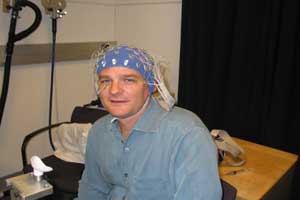 David experimenting with EEGLoyal KQED blog followers have been reading of Dr. Barry Starr’s experience getting his genes tested by 23andMe. He has tested his native American ancestry and evaluated his risk for diabetes. What if Barry took even more tests, from blood toxins to more genetic tests – would that result in a clearer picture of his health? That’s exactly the premise behind David Ewing Duncan’s new book: “The Experimental Man”.
David experimenting with EEGLoyal KQED blog followers have been reading of Dr. Barry Starr’s experience getting his genes tested by 23andMe. He has tested his native American ancestry and evaluated his risk for diabetes. What if Barry took even more tests, from blood toxins to more genetic tests – would that result in a clearer picture of his health? That’s exactly the premise behind David Ewing Duncan’s new book: “The Experimental Man”.
David takes “guinea pig” journalism to super size me heights. He was tested by numerous genetic sequencing companies, had dozens of brain scans, gave gallons of blood for toxicity tests, even had a virtual colonoscopy to understand what “personalized” medicine means for him. His experimentation was divided into 4 categories: genetics, environment, brain, and body.
My favorite experiment was a memory test in which David and I both participated. The study was on how normal aging changes the neural mechanisms of memory and attention; a study run by Dr. Adam Gazzaley of UCSF. His lab uses a combination of techniques including fMRI (functional magnetic resonance imaging -measures blood flow using a big magnet), EEG (electroencephalography - measures electrical signals in the brain), and TMS (transcranial magnetic stimulation - using a magnet to “scramble” regions of the brain).
In this experiment, I was getting an EEG, designed to measure electrical signals of the brain, in this case studying regions controlling memory and attention. I was fitted with a stylish red cap, my head was covered with a conductive gel, and I was seated a few feet from a computer screen. After some careful measurements of my head, I was ready to go.
I was shown either a face or nature scene for a split second, then the screen went blank, then I was shown another face or nature scene. My task was to decide whether the two pictures were the same. Sounds exceedingly simple, but it was far from it. I left absolutely exhausted after just a few hours!
